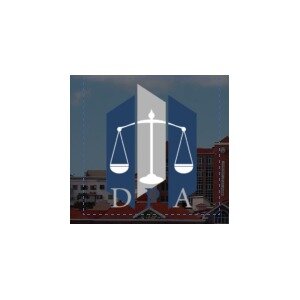Best Faith-Based Law Lawyers in Grenada
Share your needs with us, get contacted by law firms.
Free. Takes 2 min.
Or refine your search by selecting a city:
List of the best lawyers in Grenada
About Faith-Based Law in Grenada
Faith-Based Law in Grenada refers to the intersection between religious beliefs and legal principles, where religious norms guide legal decision-making within specific communities or groups. It generally involves matters such as marriage, divorce, inheritance, and the application of religious laws in a civil context. In Grenada, as in many other places, Faith-Based Law operates alongside the secular legal system, requiring careful consideration to respect both religious practices and national laws.
Why You May Need a Lawyer
There are several common scenarios in which you may find yourself needing legal assistance regarding Faith-Based Law in Grenada:
- If you are involved in a marriage or divorce where religious customs need to be observed legally.
- In inheritance cases where religious rules regarding succession may conflict with civil law.
- When establishing or managing a faith-based organization and ensuring compliance with both religious laws and national regulations.
- If you're facing disputes in family law where faith-based considerations are significant.
- To draft agreements or contracts that comply with religious norms and national laws.
Local Laws Overview
In Grenada, Faith-Based Law is primarily recognized in personal matters such as marriage and inheritance. The legal framework allows for the practice of religious customs as long as they align with national laws and public policy. Key aspects include:
- Marriage and Divorce: Religious marriages must be registered under civil law to be recognized legally. Divorce proceedings may also incorporate religious practices but must follow national legal standards.
- Inheritance and Succession: Religiously-motivated wills or distribution of assets must comply with national inheritance laws and may require legal validation to ensure enforceability.
- Organizations: Faith-based entities must adhere to laws governing non-profit organizations, including registration, taxation, and compliance with national labor laws.
Frequently Asked Questions
What is Faith-Based Law?
Faith-Based Law involves the application of religious principles to legal situations, usually in personal matters like marriage or inheritance.
Do religious marriages have legal standing in Grenada?
Yes, but they must be registered under the civil legal system to ensure they are legally binding.
Can religious practices impact legal divorce proceedings?
While religious practices can inform proceedings, divorces must comply with national legal standards to be recognized.
How does Faith-Based Law affect inheritance?
Religious norms may influence inheritance practices, but they must be structured within the confines of civil law to be enforceable.
Are there legal protections for faith-based organizations?
Yes, but these organizations must operate according to national regulations concerning registration, taxation, and employment.
Can a lawyer help reconcile conflicts between religious customs and national laws?
Yes, a lawyer specializing in Faith-Based Law can provide advice on harmonizing religious practices with legal requirements.
Is mediation available for faith-based legal disputes?
Yes, mediation services can be employed to resolve conflicts amicably, often with respect to religious values.
Do I need a separate will for religious and civil purposes?
Ideally, a will should encompass both religious wishes and conform to national law, possibly requiring legal expertise to draft.
Can faith influence contractual agreements?
Yes, contracts can be drafted to reflect religious values but must remain compliant with national laws.
Are there specialized lawyers for Faith-Based Law in Grenada?
Yes, certain legal practitioners focus specifically on dealing with cases that involve faith-based issues and laws.
Additional Resources
For those in need of further information or assistance, consider reaching out to:
- The Judicial Department of Grenada: Offers insight into civil laws that intersect with religious practices.
- Local Religious Councils: These bodies can provide guidance on religious norms and practices.
- Grenada Bar Association: Can help locate lawyers specializing in Faith-Based Law.
Next Steps
If you require legal assistance in Faith-Based Law, consider the following steps:
- Identify your specific legal need as it relates to Faith-Based Law.
- Consult with a lawyer who specializes in both faith-based and civil law aspects.
- Gather all relevant documents and information pertinent to your case.
- Consider both legal and religious advice to ensure a well-rounded approach to your situation.
- Communicate openly with your legal representative about your expectations and requirements.
Lawzana helps you find the best lawyers and law firms in Grenada through a curated and pre-screened list of qualified legal professionals. Our platform offers rankings and detailed profiles of attorneys and law firms, allowing you to compare based on practice areas, including Faith-Based Law, experience, and client feedback.
Each profile includes a description of the firm's areas of practice, client reviews, team members and partners, year of establishment, spoken languages, office locations, contact information, social media presence, and any published articles or resources. Most firms on our platform speak English and are experienced in both local and international legal matters.
Get a quote from top-rated law firms in Grenada — quickly, securely, and without unnecessary hassle.
Disclaimer:
The information provided on this page is for general informational purposes only and does not constitute legal advice. While we strive to ensure the accuracy and relevance of the content, legal information may change over time, and interpretations of the law can vary. You should always consult with a qualified legal professional for advice specific to your situation.
We disclaim all liability for actions taken or not taken based on the content of this page. If you believe any information is incorrect or outdated, please contact us, and we will review and update it where appropriate.
Browse faith-based law law firms by city in Grenada
Refine your search by selecting a city.











